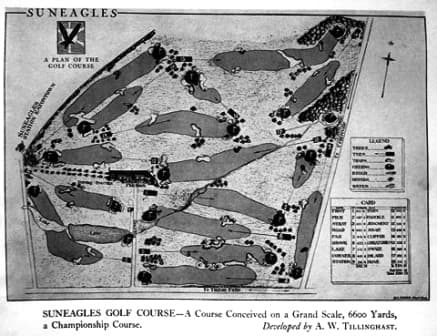Suneagles Golf Course

Suneagles Golf Course is a semi-private-open to the public 18 hole golf course located in Eatontown, New Jersey. The course was formerly a Fort Mammoth facility.
Suneagles golf course first opened for play in 1926. A. W. Tillinghast designed the course.
The course measures 6,357 yards from the back tees for a course rating of 70.7 and a slope rating of 121. The course par is 72.
From the forward tees, the course measures 5380 yards. The longest hole on the course is # 15, a par-5 that plays to 575 yards. The shortest hole on the course is # 7, a par-3 that plays to 113 yards from the back tees.
Watch out for # 4, a 433-yard par-4 challenge, and the #1 handicap hole on the course. The easiest hole at Sun Eagles Golf Course is # 11, a 470 yard par-5.
Suneagles has an exciting and storied history. In the 1920s, Max Phillips of the famed Phillips Van Heusen Clothing Company of New York City and the soft collared golf shirt designer purchased the estate of 250 acres and the adjoining winter farm of 350 acres to build a private golf club. Construction of the club began during October 1923 and when finished, consisted of an 18 hole championship golf course, a swimming pool, tennis courts, polo stables, fields, and a magnificent clubhouse, which had a retractable roof over the ballroom. This project's total construction costs were $750,000 ($500,000 for the course and $250,000 for the clubhouse). A. W. Tillinghast, described as the "Dean of American-Born Architects," whose courses include Winged Foot, Baltusrol, Bethpage Black, and others designed the course. The first Golf Professional was a Scotsman, Seymour Dunn. Members and guests would frequently see Mr. Dunn on the course in a Scottish kilt as he wanted to establish the club with a Scottish flair. There were approximately 200 members when the Suneagles Country Club opened amid significant publicity on May 29, 1926.
In the 1930s, the club was purchased by the members from Phillips and renamed the Monmouth County Country Club. Around this time, an article in Golf Illustrated magazine was written about the course. The following is an excerpt from that article: "Possessed of a charmingly designed and appointed clubhouse, its fortunate members may stay at the club. No more delightful place could be available for a golfer as they look out over the course at the glorious country beyond through the ample casement windows. The clubhouse is Tudor in character and was designed by B. Hustace Simonson, known for the design of many of the finest examples in the U. S. of the architecture of this period. Monmouth County has one of the most handsome and best appointed clubhouses in the Metropolitan districts."
The US Army purchased the Monmouth County Country Club in 1942 for the unbelievable low price of $42,000. The purchase included the club house (Gibbs Hall), golf course, swimming pool, tennis courts, and polo fields, the Charles Wood housing area.
Sun Eagles golf course was the site of the 1935 NJ Golf Association Open Championship which was won by the legendary golfer, Byron Nelson. His first professional victory. The course record of 65 was established in 1935 and is held by Gene Saranzen. Sune Egles was also the site of the 1963 All Army Golf Trials, which was won by Lt. Frank James, while Sergeant Orville Moody came in second. Orville Moody subsequently turned pro in 1967 and won the U. S. Open Championship in 1969. Other famous Sun Eagles golfers have included Babe Ruth, Sam Snead, and the 1941 PGA winner, Vic Ghezzi. For most of this time (39 years), the professional was John W. Welsh Jr., better known as Jack Welsh, who still plays on the course (As of 2011).
Although Sun Eagles changed while being under the ownership of the U. S. Army, it is still known as a challenging and rewarding golf course and one of the premier Army golf courses in the world.